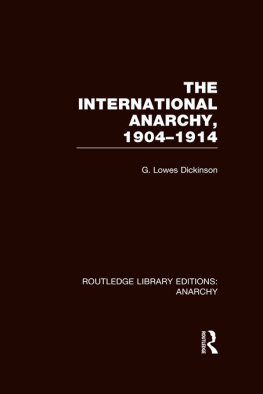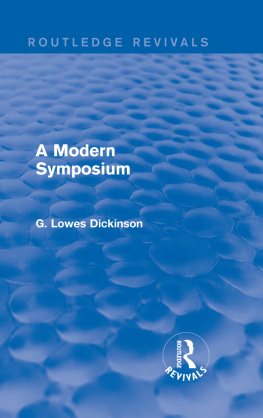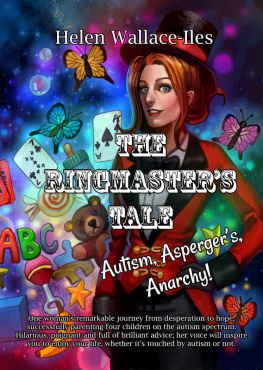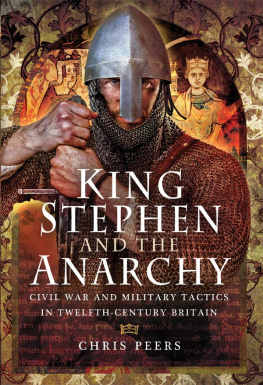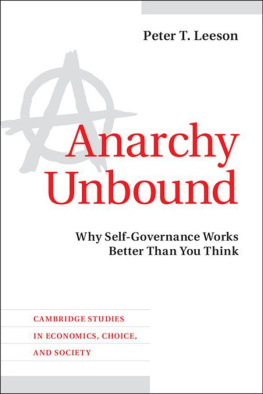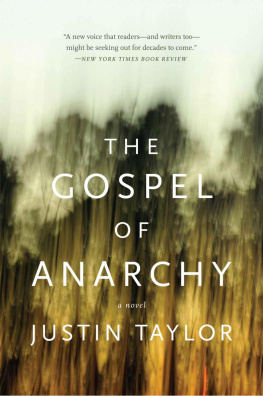First published in 1926
This edition first published in 2013
by Routledge
2 Park Square, Milton Park, Abingdon, Oxon, OX14 4RN
Simultaneously published in the USA and Canada
by Routledge
711 Third Avenue, New York, NY 10017
Routledge is an imprint of the Taylor & Francis Group, an informa business
1926 George Allen & Unwin Ltd
All rights reserved. No part of this book may be reprinted or reproduced or utilised in any form or by any electronic, mechanical, or other means, now known or hereafter invented, including photocopying and recording, or in any information storage or retrieval system, without permission in writing from the publishers.
Trademark notice: Product or corporate names may be trademarks or registered trademarks, and are used only for identification and explanation without intent to infringe.
British Library Cataloguing in Publication Data
A catalogue record for this book is available from the British Library
ISBN: 978-0-415-83448-3 (Set)
eISBN: 978-0-203-77102-0 (Set)
ISBN: 978-0-415-83943-3 (Volume 1)
eISBN: 978-0-203-77105-1 (Volume 1)
Publishers Note
The publisher has gone to great lengths to ensure the quality of this reprint but points out that some imperfections in the original copies may be apparent.
Disclaimer
The publisher has made every effort to trace copyright holders and would welcome correspondence from those they have been unable to trace.
Foreword to the Popular Edition
By S IR A RTHUR S ALTER
L OWES D ICKINSON was by nature a poet and a philosopher. His Goethe, The Magic Flute , his poems, and the felicitous idealisation of the Chinese outlook on life in his Letters from John Chinaman indicate what would, in a happier age, have been the sphere of his work and interest. He was impelled to the study of politics and public affairs, not because these were for him of intrinsically equal value, but because they deal with the conditions upon which all higher values are dependent. In particular, in the latter years of his life his mind was occupied with the menace of another war which would be destructive of all civilisation. And more and more the core of his convictions was expressed in a single theme. War results from the juxtaposition of independent states, armed and sovereign, neither recognising nor willing to establish any superior authority; and will be inevitable while that fundamental cause remains.
I well remember the impression made on me by Lowes Dickinsons European Anarchy of 1916 in which he first advanced the theme he was to develop more fully in the present book ten years later. I had read and re-read the history of the previous half-century. But I had read, as most people then read, and many do now, without any real understanding of the inner springs of action. As dispute and crisis succeeded each other, we searched for the immediate causes, allotted blame or praise to the several negotiatorsand took for granted everything that was below the surface. Or occasionally, at the best, we would penetrate a little deeper and realise that there were enduring conflicts of economic interest or political ambition, of which more trivial occasions of dispute were in some part the temporary and superficial expression. Few of us, however, penetrated to the deeper truth. We did not realise that, necessary as it was that separate sovereign States should show a magnanimous wisdom and restraint in their economic policies and a moderation in their political aspirations, this by itself could never be enough; for, however much the causes of conflict might be so reduced, they could never be eliminated, and unless there was some method of settlement beyond negotiation based upon the known competitive strength behind the negotiators, sooner or later this strength would be brought to a trial in warfare. State virtue can no more by itself be relied on as a means of avoiding violence than personal virtue could be without the strong framework for all our interacting interests of an enforceable system of law. Some optimists have indeed imagined a time in which the virtues of good citizenship will have so developed that the State can be safely allowed to fade away. But the most sanguine of them have only conceived of this as possible after civic virtue has been long trained in a system of law enforced by the State, never as a prior alternative. In international affairs we have not yet reached that first stage; we have only made a first effort in the establishment of the League of Nations, and its present weakness is not due to the fact that the conflicting ambitions of sovereign States have been so reduced that a controlling authority is not needed. On the contrary, it is due to the fact that they are so powerful that they are reluctant to tolerate it. And it is just as true in international affairs as in the relations of men within a nation, that anarchy inevitably results in violence.
No one perhaps perceived this truth at once so soon and so vividly as Lowes Dickinson, or has so richly supported it by historical illustration and persuasive argument. The International Anarchy , in which he develops his theme most fully, deserves to be both a classic and a best-seller. It depicts, as in a Greek drama, the tragic evolution of European politics from 1870 to 1914, the statesmen being no more than 41 little puppets, knocking away with lilliputian hammers the last stays that restrained the launch of that great death-ship, war.
His theme is stated briefly in an introduction and still more briefly in a few concluding paragraphs. Within this setting the main part of the book describes the evolution of the relations between the four protagonists, France, Germany, Russia, and Great Britain, and his chapter headings indicateon a constantly enlarging time-scalethe tragic sequence of political events, the Triple Alliance and Bismarcks secret treaties, the Triple Entente, Morocco and the Conference of Algeciras, the Annexation of Bosnia, Agadir, Tripoli, the Bagdad Railway, Persia, The Far East, The Balkan Wars, The Last Year, The Hague Conferences, Armaments, and The Last Three Weeks.
At first sight, therefore, his book is one more volume in the library of research into the origins of the war. If it were only that, or mainly that, it would have long been superseded, for immense stores of new evidence have become available since he wrote. Its value remains, however, because while the rest of the library deals with the action of individuals the whole meaning and purpose of his book is to indicate the underlying forces of which they were the victims. His actual account of political events is accurate and unbiased, and is based on a full and meticulous examination of all the sources available at the time. The picture presented is a true one, and all the new information that is now in our possession has only added further detail, without changing the main outline and design. Never has the general picture been more vividly, or more faithfully, presented; and all later experience only shows more conclusively that his interpretation is the true one.
His book therefore remains of abiding interest and importance. I am glad that while it is now being published in a popular form the integrity of the text to which a classic is entitled is being preserved. Mr. Frank Hardie has added a few valuable footnotes as to a few crucial developments since 1926, but what Dickinson wrote is left in its entirety without omission, amendment, or supplement.

